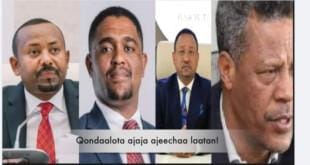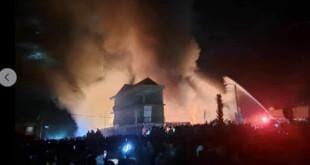African Intelligence (Indian Ocean Newsletter) | May 12, 2014
The general election looming ahead in 2015 is already casting a shadow over the Ethiopian government, whose sole uniting bond would seem to be its praise for the memory of its late Prime Minister Meles Zenawi.
His portraits are on all the walls in Addis Ababa, which was not the case when he was alive, and in the Federal Assembly a video projector plays his speeches with the aim of inspiring the new MPs. And yet, since Meles Zenawi died in August 2012, the federal government has been rudderless, lacking a descendent.
His successor as Prime Minister, Haile Mariam Desalegn, has neither the grip nor the political clout and has not managed to impose himself on the other political leaders. He frequently has to be content with merely dealing with everyday business. While it is true the Ethiopian State, whose tradition goes back a long way, has not fallen into decadence, the different factions and regionalist tendencies are making federal power increasingly fragmented.
Divisions produce inertia ; Going beyond appearances, the ruling coalition Ethiopian People Revolutionary Democratic Front (EPRDF) is in an embryonic crisis state. Its central core, the Tigray People Liberation Front (TPLF), is deeply divided between the faction led by Tigray Regional State President Abay Woldu, and the faction headed by Deputy Prime Minister Debretsion Gebremichael, not to forget the various other Tigrayan sub-factions such as those of the elderly Marxist Sebhat Nega and the Meles Zenawi’s widow Azeb Mesfin.
Facing this inter-Tigrayan squabble, the Amhara in the ANDM and the Oromo in the OPDO (two of the parties in the ruling coalition) are watching from the wings, biding their time before they go into the arena. This freezes the decision-making power, as each faction does not want to make the wrong decision and yield an advantage to its rivals. In early April, speaking on a live TV debate (a rare event in itself), Amare Aregawi the editor of The Reporter asked the Prime Minister who is it that makes the decisions in his office and whether he is capable of making any himself. Much to the surprise of the viewers who are used to seeing decisiveness on their screens, Haile Mariam Desalegn mumbled an unconvincing response, confirming that the question had indeed struck home.
The economy and diplomacy are broken Ethiopian diplomacy suffers from a lack of leadership at the top of country. Questions about the situation in Somalia are left to the head of the Ethiopian army which is intervening directly in its neighbour territory. In the case of the IGAD mediation in the South Sudan crisis, the former foreign affairs minister Seyoum Mesfin was recalled from his post of ambassador to Beijing to lead the mediation. He nevertheless played a fairly effective role of mediator, which was largely taken over by the Ugandan President Yoweri Museveni even though Ethiopia did at the time hold the presidency of IGAD.
Similar blockages have produced similar effects in the management of the State-owned companies. The telephone network run by Ethio Telecom (formerly ETC) provides a very poor service, mainly because of frequent electricity outages which also affect the water distribution system when the electric pumps stop running. The cause is breakdowns of the aging transformers purchased from India by the Ethiopian Electric Power Corporation (EEPCO) several years ago. Today, EEPCO and ETC are squabbling over who should pay the cost of renovating the electricity system, a problem which Debretsion Gebremichael, the chairman of the EEPCO and ETC boards, has been unable to settle.
Regionalism becoming more intense Since the end of April, the federal police have brutally repressed student protests against the Master Plan in several universities in the Oromia Regional State. This Master Plan involves the expansion of Addis Ababa whose mayor, Diriba Kuma, is also an Oromo.
In the students view, this project would eat into Oromo land and reduce the area their language is used. This regionalist exacerbation is illustrated by certain of the student slogans, proclaiming “Oromia for the Oromos and by the start of misdemeanours against Amhara farmers obliged to leave their land and take refuge in Addis Ababa.
Certain TPLF officials have no qualms to explain that in their view, some ultra-regionalist elements of the ruling OPDO are discreetly fuelling this student protest movement against the Master Plan.




